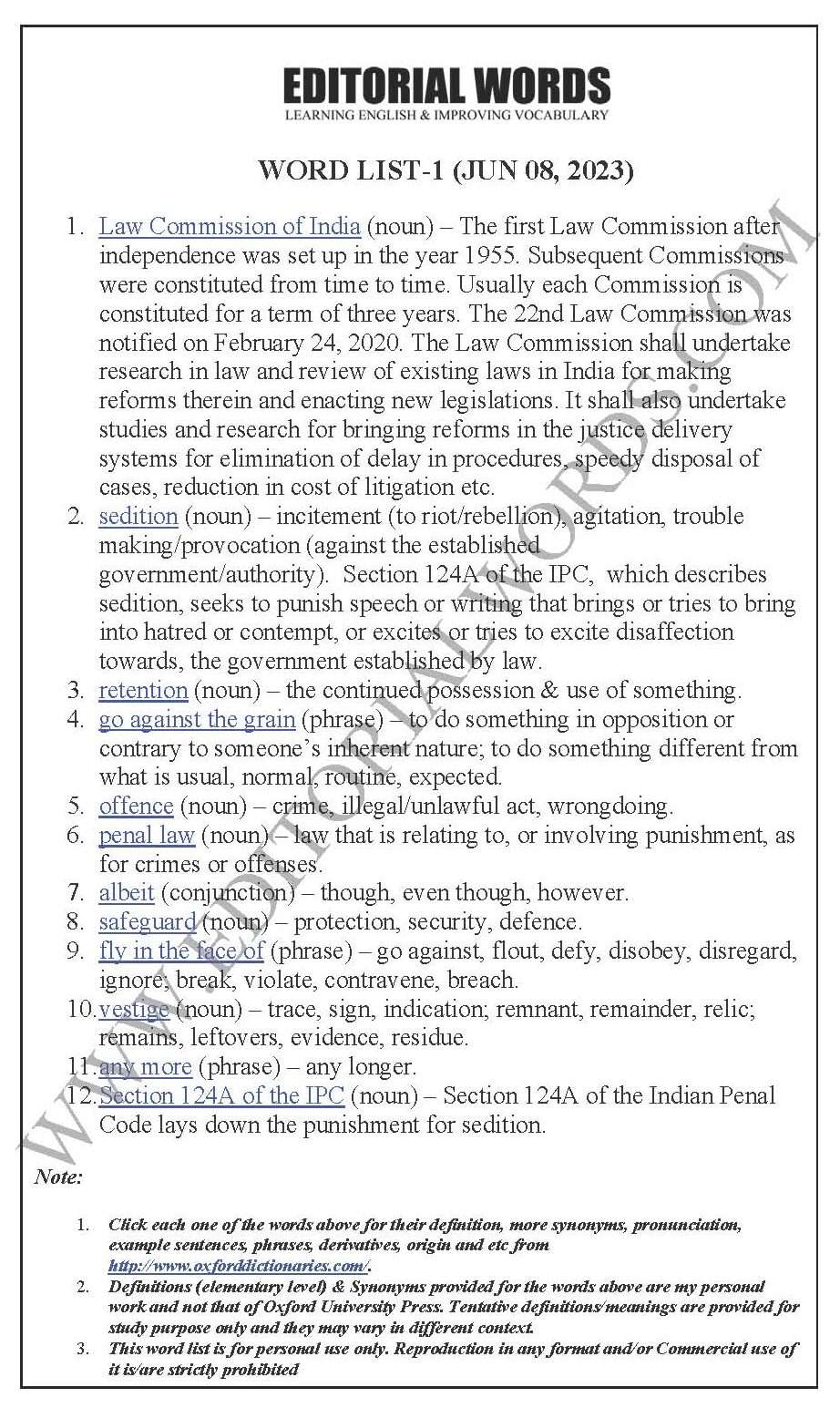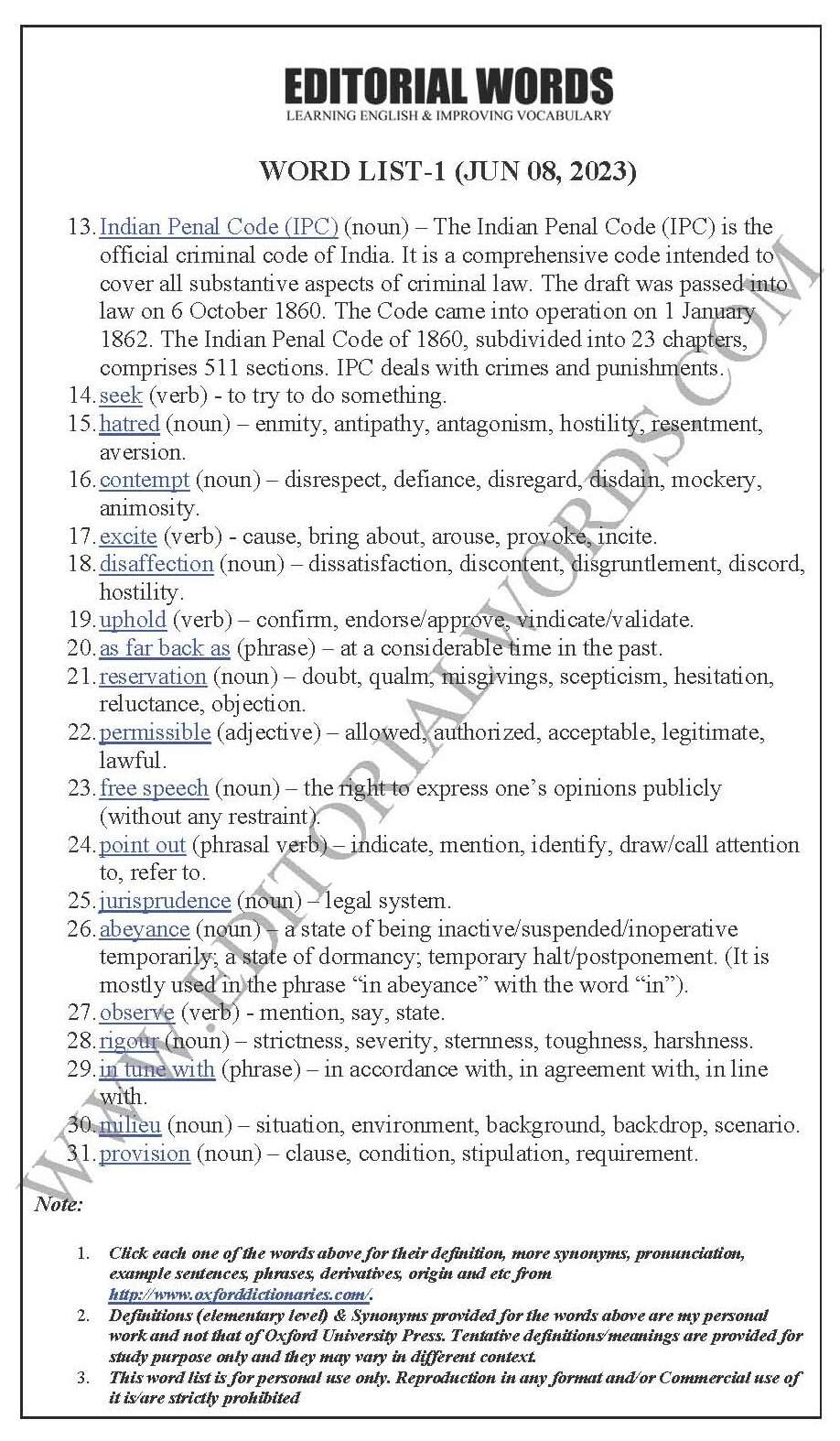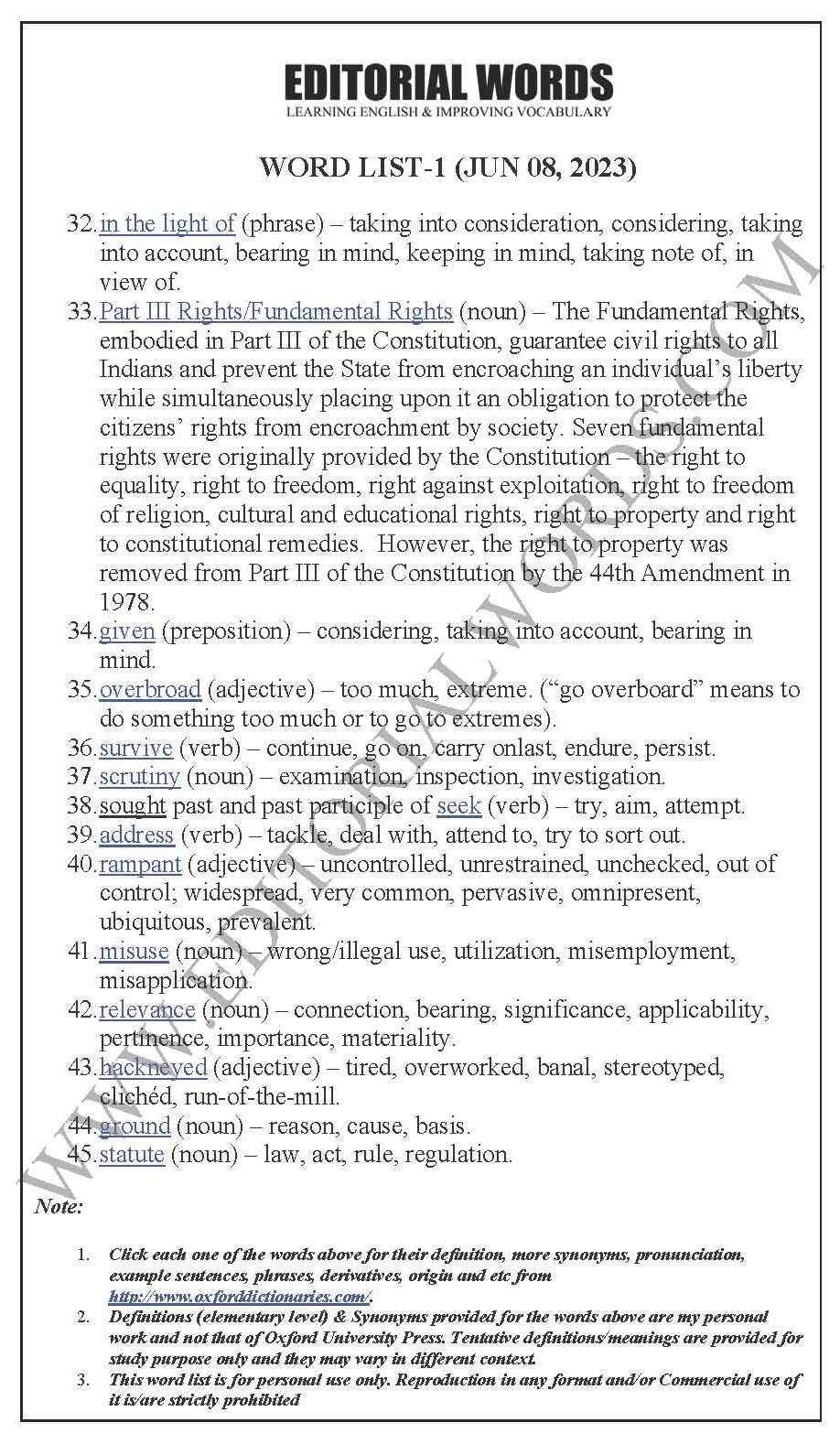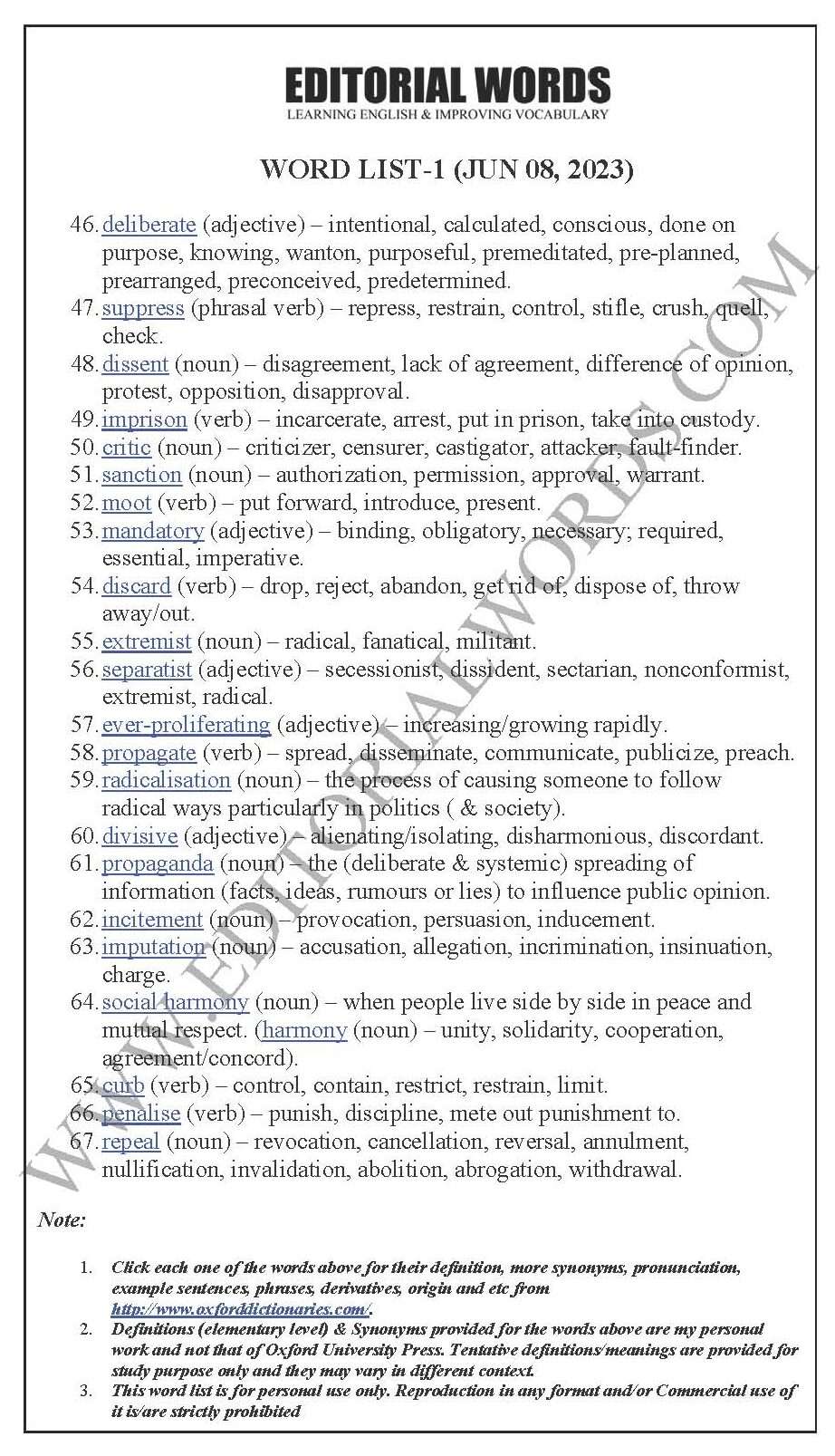The Hindu Editorial (End the debate) – June 08, 2023
To read this article, click “The Hindu”.
This preview is provided here with permission.
Courtesy: The Hindu
The Hindu Editorial (End the debate) – June 08, 2023:
- Law Commission of India (noun) – The first Law Commission after independence was set up in the year 1955. Subsequent Commissions were constituted from time to time. Usually each Commission is constituted for a term of three years. The 22nd Law Commission was notified on February 24, 2020. The Law Commission shall undertake research in law and review of existing laws in India for making reforms therein and enacting new legislations. It shall also undertake studies and research for bringing reforms in the justice delivery systems for elimination of delay in procedures, speedy disposal of cases, reduction in cost of litigation etc.
- sedition (noun) – incitement (to riot/rebellion), agitation, trouble making/provocation (against the established government/authority). Section 124A of the IPC, which describes sedition, seeks to punish speech or writing that brings or tries to bring into hatred or contempt, or excites or tries to excite disaffection towards, the government established by law.
- retention (noun) – the continued possession & use of something.
- go against the grain (phrase) – to do something in opposition or contrary to someone’s inherent nature; to do something different from what is usual, normal, routine, expected.
- offence (noun) – crime, illegal/unlawful act, wrongdoing.
- penal law (noun) – law that is relating to, or involving punishment, as for crimes or offenses.
- albeit (conjunction) – though, even though, however.
- safeguard (noun) – protection, security, defence.
- fly in the face of (phrase) – go against, flout, defy, disobey, disregard, ignore; break, violate, contravene, breach.
- vestige (noun) – trace, sign, indication; remnant, remainder, relic; remains, leftovers, evidence, residue.
- any more (phrase) – any longer.
- Section 124A of the IPC (noun) – Section 124A of the Indian Penal Code lays down the punishment for sedition.
- Indian Penal Code (IPC) (noun) – The Indian Penal Code (IPC) is the official criminal code of India. It is a comprehensive code intended to cover all substantive aspects of criminal law. The draft was passed into law on 6 October 1860. The Code came into operation on 1 January 1862. The Indian Penal Code of 1860, subdivided into 23 chapters, comprises 511 sections. IPC deals with crimes and punishments.
- seek (verb) – to try to do something.
- hatred (noun) – enmity, antipathy, antagonism, hostility, resentment, aversion.
- contempt (noun) – disrespect, defiance, disregard, disdain, mockery, animosity.
- excite (verb) – cause, bring about, arouse, provoke, incite.
- disaffection (noun) – dissatisfaction, discontent, disgruntlement, discord, hostility.
- uphold (verb) – confirm, endorse/approve, vindicate/validate.
- as far back as (phrase) – at a considerable time in the past.
- reservation (noun) – doubt, qualm, misgivings, scepticism, hesitation, reluctance, objection.
- permissible (adjective) – allowed, authorized, acceptable, legitimate, lawful.
- free speech (noun) – the right to express one’s opinions publicly (without any restraint).
- point out (phrasal verb) – indicate, mention, identify, draw/call attention to, refer to.
- jurisprudence (noun) – legal system.
- abeyance (noun) – a state of being inactive/suspended/inoperative temporarily; a state of dormancy; temporary halt/postponement. (It is mostly used in the phrase “in abeyance” with the word “in”).
- observe (verb) – mention, say, state.
- rigour (noun) – strictness, severity, sternness, toughness, harshness.
- in tune with (phrase) – in accordance with, in agreement with, in line with.
- milieu (noun) – situation, environment, background, backdrop, scenario.
- provision (noun) – clause, condition, stipulation, requirement.
- in the light of (phrase) – taking into consideration, considering, taking into account, bearing in mind, keeping in mind, taking note of, in view of.
- Part III Rights/Fundamental Rights (noun) – The Fundamental Rights, embodied in Part III of the Constitution, guarantee civil rights to all Indians and prevent the State from encroaching an individual’s liberty while simultaneously placing upon it an obligation to protect the citizens’ rights from encroachment by society. Seven fundamental rights were originally provided by the Constitution – the right to equality, right to freedom, right against exploitation, right to freedom of religion, cultural and educational rights, right to property and right to constitutional remedies. However, the right to property was removed from Part III of the Constitution by the 44th Amendment in 1978.
- given (preposition) – considering, taking into account, bearing in mind.
- overbroad (adjective) – too much, extreme. (“go overboard” means to do something too much or to go to extremes).
- survive (verb) – continue, go on, carry onlast, endure, persist.
- scrutiny (noun) – examination, inspection, investigation.
- sought past and past participle of seek (verb) – try, aim, attempt.
- address (verb) – tackle, deal with, attend to, try to sort out.
- rampant (adjective) – uncontrolled, unrestrained, unchecked, out of control; widespread, very common, pervasive, omnipresent, ubiquitous, prevalent.
- misuse (noun) – wrong/illegal use, utilization, misemployment, misapplication.
- relevance (noun) – connection, bearing, significance, applicability, pertinence, importance, materiality.
- hackneyed (adjective) – tired, overworked, banal, stereotyped, clichéd, run-of-the-mill.
- ground (noun) – reason, cause, basis.
- statute (noun) – law, act, rule, regulation.
- deliberate (adjective) – intentional, calculated, conscious, done on purpose, knowing, wanton, purposeful, premeditated, pre-planned, prearranged, preconceived, predetermined.
- suppress (phrasal verb) – repress, restrain, control, stifle, crush, quell, check.
- dissent (noun) – disagreement, lack of agreement, difference of opinion, protest, opposition, disapproval.
- imprison (verb) – incarcerate, arrest, put in prison, take into custody.
- critic (noun) – criticizer, censurer, castigator, attacker, fault-finder.
- mere (adjective) – only, just.
- sanction (noun) – authorization, permission, approval, warrant.
- moot (verb) – put forward, introduce, present.
- mandatory (adjective) – binding, obligatory, necessary; required, essential, imperative.
- lead to (verb) – cause, result in, bring about, bring on.
- the fact that (phrase) – used to refer to a specific situation under consideration/discussion.
- discard (verb) – drop, reject, abandon, get rid of, dispose of, throw away/out.
- extremist (noun) – radical, fanatical, militant.
- separatist (adjective) – secessionist, dissident, sectarian, nonconformist, extremist, radical.
- ever-proliferating (adjective) – increasing/growing rapidly.
- propagate (verb) – spread, disseminate, communicate, publicize, preach.
- radicalisation (noun) – the process of causing someone to follow radical ways particularly in politics ( & society).
- divisive (adjective) – alienating/isolating, disharmonious, discordant.
- propaganda (noun) – the (deliberate & systemic) spreading of information (facts, ideas, rumours or lies) to influence public opinion.
- incitement (noun) – provocation, persuasion, inducement.
- imputation (noun) – accusation, allegation, incrimination, insinuation, charge.
- social harmony (noun) – when people live side by side in peace and mutual respect. (harmony (noun) – unity, solidarity, cooperation, agreement/concord).
- curb (verb) – control, contain, restrict, restrain, limit.
- penalise (verb) – punish, discipline, mete out punishment to.
- notwithstanding (preposition) – despite, in spite of, regardless of.
- repeal (noun) – revocation, cancellation, reversal, annulment, nullification, invalidation,, abolition, abrogation, withdrawal.
Note:
1. Click each one of the words above for their definition, more synonyms, pronunciation, example sentences, phrases, derivatives, origin and etc from http://www.oxforddictionaries.com/.
2. Definitions (elementary level) & Synonyms provided for the words above are my personal work and not that of Oxford University Press. Tentative definitions/meanings are provided for study purpose only and they may vary in a different context.
3. This word list is for personal use only. Reproduction in any format and/or Commercial use of it is/are strictly prohibited.
The Hindu Editorial (End the debate) – June 08, 2023:




“Phrasal Verbs” We Learnt Last Week
“Idioms & Phrases” We Learnt Last Week
“Important Definitions” We Learnt Last Week
Recent Word Lists For The Hindu Editorial Articles

The Law Commission’s recommendation that the offence of sedition be retained in penal law, albeit with some safeguards,… For further reading, visit “The Hindu“. Below is today’s word list-1 for The Hindu Editorial (End the debate) – June 08, 2023.